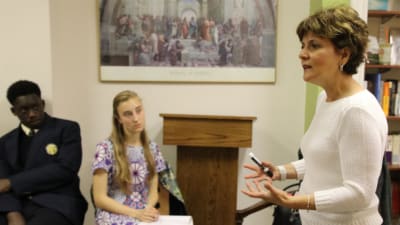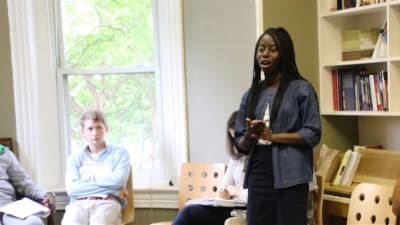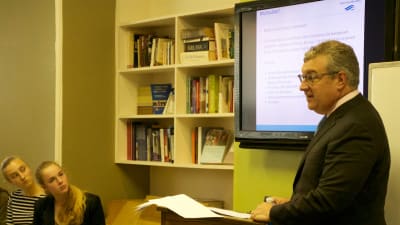Social Venture Projects (or, taking SEGL home)
As the semester zooms toward its end, many of our students want to take a piece of SEGL home with them. In fact, they can, and they do: the Social Venture Project capstone ensures that.
One of three capstone projects that each SEGL graduate completes, the “SVP” allows students to put the skills and knowledge they gained in DC–public speaking, negotiation, coalition building, persuasive writing, and more–to work immediately.
Along the way, we introduce our students to successful social entrepreneurs in the for-profit and non-profit sectors, along with those who provide support for social ventures.
One example of these introductions is our earlier “Fridie Foundation” case study featuring social entrepreneurship coach Joe Weinstein and visits to four local nonprofits. Two other examples came several weeks later.
First, we welcomed Liz Wainger, the founder and principal of the Wainger Group, a strategic communications and public relations firm based in the DC area. Her clients include the National Endowment for the Arts, the National Trust for Historic Preservation, and the InterAmerican Development Bank. (Ms. Wainger is also an SEGL trustee.) Wainger spoke with the students about how to hone a message that will resonate effectively with stakeholders.
For example, most entrepreneurs focus on what a venture does (educate 24 high school juniors in ethics and global leadership) rather than the problem the venture solves (we need more ethical leaders in our world). Starting with the latter is a far better hook. To help make this point clear, Wainger paired the students up and had them “pitch” their project to each other; she then asked each partner to explain the other’s venture to the group. What was included, what was missing, what was compelling, and why? Later, after giving some key pointers, she had several students restate their pitch to the entire group. The change was clear and promising.
Later, we welcomed an Joseph Brandt, the President of Contour Global, a “developer and operator of electric power and district heating businesses” around the world. Brandt’s subject was KivuWatt, a remarkable solution to a multi-pronged challenge in Rwanda (which we studied earlier this semester). The challenge? Lake Kivu, one of the world’s largest lakes, has an enormous amount of toxic methane and carbon dioxide gas at its bottom. If it comes to the surface (which it will do without warning if current conditions persist), the gas will kill as many as two million people. At the same time, Rwanda–the most densely populated country in the world–lacks adequate rural electrification. And the country is still recovering from a gruesome genocide in 1994.
KivuWatt’s creative solution–to harvest the methane using a floating “drilling” barge that powers an offshore power plant–helps solve all of these problems. You can view the company’s short video about the project here.
However, the project hasn’t been easy. Brandt confronted countless ethical leadership challenges as he negotiated with Rwandan President Paul Kagame, built relationships with the local population, managed foreign workers, and faced attempts to corrupt his operation. (We can’t go into further detail, because Brandt asked us to follow company practice and “say it in the room; keep it in the room,” meaning “speak up if you disagree inside the room, rather than venting privately afterwards, and do not share sensitive information with those who were not present.”)
To explore these challenges, Brandt divided the students into small groups and challenged them over and over again with the very ethical dilemmas that he faced. Once the student groups weighed in, he explained what he had done and why, while acknowledging that the student answers might also have been excellent ways forward.
The experience left the students buzzing on the walk home and over dinner. More important, it helped them realize the complexity of leadership: balancing many competing and often noble interests means making difficult decisions that are bound to upset some observers.
As the semester finishes, we are grateful and excited that both these speakers were able to share their time with our students, and know that their expertise will ripple outward into 24 social venture projects and countless other ventures in the years ahead. We could already see the benefits of these visits during the students’ final social venture project presentations in our final week (thanks also to Joe Weinstein for returning to judge them!).
Next up: an extraordinary week involving three White House leaders and a five-hour crisis simulation!







